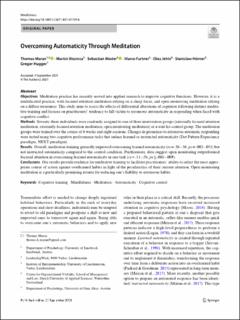Please use this identifier to cite or link to this item:
https://doi.org/10.21256/zhaw-23296Full metadata record
| DC Field | Value | Language |
|---|---|---|
| dc.contributor.author | Maran, Thomas | - |
| dc.contributor.author | Woznica, Martin | - |
| dc.contributor.author | Moder, Sebastian | - |
| dc.contributor.author | Furtner, Marco | - |
| dc.contributor.author | Jehle, Elias | - |
| dc.contributor.author | Hörner, Stanislaw | - |
| dc.contributor.author | Hugger, Gregor | - |
| dc.date.accessioned | 2021-10-14T16:04:41Z | - |
| dc.date.available | 2021-10-14T16:04:41Z | - |
| dc.date.issued | 2021-09-23 | - |
| dc.identifier.issn | 1868-8527 | de_CH |
| dc.identifier.issn | 1868-8535 | de_CH |
| dc.identifier.uri | https://digitalcollection.zhaw.ch/handle/11475/23296 | - |
| dc.description.abstract | Objectives Meditation practice has recently moved into applied research to improve cognitive functions. However, it is a multifaceted practice, with focused attention meditation relying on a sharp focus, and open monitoring meditation relying on a diffuse awareness. This study aims to assess the effects of differential alterations of cognition following distinct meditative training and focuses on practitioners’ tendency to fall victim to erroneous automaticity in responding when faced with cognitive conflict. Methods Seventy-three individuals were randomly assigned to one of three intervention groups (internally focused attention meditation, externally focused attention meditation, open monitoring meditation) or a wait list control group. The meditation groups were trained over the course of 4 weeks and eight sessions. Changes in proneness to erroneous automatic responding were tested using two cognitive performance tasks that induce learned or instructed automaticity (Dot Pattern Expectancy paradigm, NEXT-paradigm). Results Overall, meditation training generally improved overcoming learned automaticity (rs?=?.26–.36, ps?=?.002–.031) but not instructed automaticity compared to the control condition. Furthermore, data suggest open monitoring outperformed focused attention in overcoming learned automaticity in one task (rs?=?.31–.56, ps?=?.001–.009). Conclusions Our results provide evidence for meditative training to facilitate practitioners’ ability to select the most appropriate course of action against overlearned habits in light of the peculiarities of their current situation. Open monitoring meditation is a particularly promising avenue for reducing one’s liability to erroneous habits. | de_CH |
| dc.language.iso | en | de_CH |
| dc.publisher | Springer | de_CH |
| dc.relation.ispartof | Mindfulness | de_CH |
| dc.rights | http://creativecommons.org/licenses/by/4.0/ | de_CH |
| dc.subject | Automaticity | de_CH |
| dc.subject | Cognitive control | de_CH |
| dc.subject | Cognitive training | de_CH |
| dc.subject | Mindfulness | de_CH |
| dc.subject.ddc | 150: Psychologie | de_CH |
| dc.title | Overcoming automaticity through meditation | de_CH |
| dc.type | Beitrag in wissenschaftlicher Zeitschrift | de_CH |
| dcterms.type | Text | de_CH |
| zhaw.departement | School of Management and Law | de_CH |
| zhaw.organisationalunit | Institute for Organizational Viability (IOV) | de_CH |
| dc.identifier.doi | 10.1007/s12671-021-01749-8 | de_CH |
| dc.identifier.doi | 10.21256/zhaw-23296 | - |
| zhaw.funding.eu | No | de_CH |
| zhaw.originated.zhaw | Yes | de_CH |
| zhaw.publication.status | publishedVersion | de_CH |
| zhaw.publication.review | Peer review (Publikation) | de_CH |
| zhaw.author.additional | No | de_CH |
| zhaw.display.portrait | Yes | de_CH |
| Appears in collections: | Publikationen School of Management and Law | |
Files in This Item:
| File | Description | Size | Format | |
|---|---|---|---|---|
| 2021_Maran_Overcoming_Automaticity_Through_Meditation_Mindfulness.pdf | 1.2 MB | Adobe PDF |  View/Open |
Show simple item record
Maran, T., Woznica, M., Moder, S., Furtner, M., Jehle, E., Hörner, S., & Hugger, G. (2021). Overcoming automaticity through meditation. Mindfulness. https://doi.org/10.1007/s12671-021-01749-8
Maran, T. et al. (2021) ‘Overcoming automaticity through meditation’, Mindfulness [Preprint]. Available at: https://doi.org/10.1007/s12671-021-01749-8.
T. Maran et al., “Overcoming automaticity through meditation,” Mindfulness, Sep. 2021, doi: 10.1007/s12671-021-01749-8.
MARAN, Thomas, Martin WOZNICA, Sebastian MODER, Marco FURTNER, Elias JEHLE, Stanislaw HÖRNER und Gregor HUGGER, 2021. Overcoming automaticity through meditation. Mindfulness. 23 September 2021. DOI 10.1007/s12671-021-01749-8
Maran, Thomas, Martin Woznica, Sebastian Moder, Marco Furtner, Elias Jehle, Stanislaw Hörner, and Gregor Hugger. 2021. “Overcoming Automaticity through Meditation.” Mindfulness, September. https://doi.org/10.1007/s12671-021-01749-8.
Maran, Thomas, et al. “Overcoming Automaticity through Meditation.” Mindfulness, Sept. 2021, https://doi.org/10.1007/s12671-021-01749-8.
Items in DSpace are protected by copyright, with all rights reserved, unless otherwise indicated.